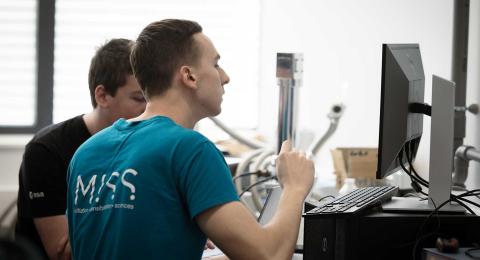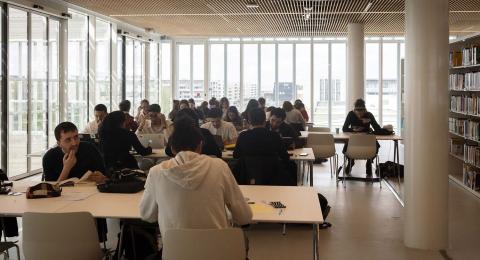Innovation, Enterprise and Society
Information
Master’s Year 1
Master’s Year 2
Learning outcome targets
THIS MASTER'S PROGRAM IS ONLY IN FRENCHCE MASTER EST UNIQUEMENT EN FRANÇAISLamention Innovation Entreprise et Sociétéoffre une formation dehaut niveau, permettant de comprendre et de gérer les enjeux liés à l’innovation et aux défis économiques et technologiques qui y sont associés.L’objectif de la mention est de former des expertsdans les domaines suivants :
• Management de l’innovation et de la technologie: l’innovation est un phénomène complexe qui part de la genèse d’une idée, d’un concept et aboutit à la mise sur le marché d’une nouvelle technologie, de nouveaux produits et services. Il importe donc d’acquérir les compétences permettant de piloter, de financer, de réaliser et de valoriser les innovations. Nos masters vous forment au
• Management de projets innovants dans le domaine du numérique, de la santé
• Marketing de l’innovation
• Valorisation de la recherche à traversl’open innovation, la gestion des partenariats
• Création d'entreprise et entrepreneuriat
• Transformation numérique des entrepriseset économie des réseaux : l’innovation et les performances des entreprises s’appuient sur leur capacité à numériser leur processus de gestion et de production (= digitalisation des processus), la gestion et la mise en place de plateformes permettant d’accéder à des services ou d’organiser la production et la logistique dans un contexte d’économie numérique et collaborative. Nos masters vous forment à :
• Transformationnumériquedes entreprises qui traversent tous les secteurs tels que le commerce, la santé, les transports,le secteur public, la consommation d’énergie…
• Economie des plateformes au cœur de l’économie numérique
• Problématique de la Blockchain, Intelligence Artificielle, Données personnelles, etc.
• Sciences des données et Big DataLes compétences offertes s’appuient notamment sur les domaines de l’économie, du management, du droit mais aussi de l’informatique et des techniques quantitatives.Il s'agit d'acquérir les compétences ainsi que les pratiques professionnelles permettant de comprendre et de maîtriser l'écosystème d'innovation ainsi que les pratiques managériales. Résolument fondée sur la formation par la recherche, la mention offre les fondements conceptuels, les outils opérationnels ainsi que les méthodologies qualitatives et quantitatives qui permettent maîtriser et de gérer les évolutions des pratiques managériales et règlementaires qui caractérisent tous les types d'organisation tels que les grandes entreprises, les PME, les start-ups ou encore les institutions publiques.Présentation de la mention Innovation Entreprises et Société en video : https://www.youtube.com/watch?v=BXJeDE1-evgQuels sont les atouts de la Mention IES de Paris Saclay ?
• Le M1 donne accès à 6 parcours différents spécifiques aux thématiques suivantes :
• Management de l’innovation,Valorisation de la recherche et entrepreneuriat
• M2 Innovation et Performance dans les entreprises du vivant (IPEV)
• M2 Innovation et Valorisation de la recherche (IVR)
• Transformation digitale et économie numérique
• M2 Industrie des réseaux et économie numérique (IREN)
• M2 Innovation, Digital et Conseil (IDC)
• Science de données et Marketing de l'innovation
• M2 Marketing de l’innovation (MI)
• M2 Innovation, Marché et Sciences de données (IMSD)
• Le M1 donne accès à 5 formations en alternance ou contrat de professionnalisation
• M2 IREN, IDC, MI, IMSD en alternance
• M2 IVR en EAD en contrat de professionnalisation
• Un M1 en Présentiel et un M1 enEnseignement à distance
• Des Master 2 avec uneforte insertion professionnelledès la sortie de la formation







